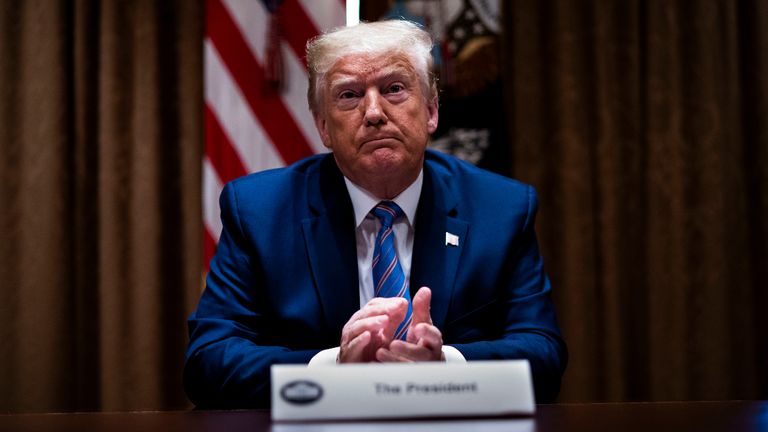Juneteenth: The story behind the celebration - and why Trump is getting involved
A longstanding commemoration of black Americans' emancipation, Mr Trump's reaction to criticism around it has been unusual.
Friday 19 June 2020 04:07, UK
The US president must have been speaking for himself when he claimed "nobody had ever heard of it" - as Juneteenth has been celebrated every 19 June for over 150 years.
The day when millions of African-Americans across the country mark freedom from slavery, the unofficial holiday gets its name from combining June and 19.
It is also known as "Juneteenth Independence Day", "Freedom Day" or "Emancipation Day".
How did it come about?
Abraham Lincoln's Emancipation Proclamation did not free slaves overnight.
After it was issued on 1 January 1863, it took over two-and-a-half years for it to become a reality.
Throughout that period, thousands of Black Americans did not know about their freedom. Enslaved labour continued in southern states because of resistance to the proclamation.
Juneteenth celebrates 19 June 1865, when federal troops arrived in Galveston, Texas, bringing freedom to the last remaining slaves.
How is it celebrated?
The 1865 celebrations included prayer, dance and feasts. They became annual events whose traditions have continued to this day.
They include religious services and readings of the Emancipation Proclamation. There is a big focus on food, with many arranging barbecues and picnics.
There are also parades, family get-togethers, park parties, historical re-enactments, blues festivals and Miss Juneteenth contests.
Despite many official celebrations being cancelled because of coronavirus, there is an extra significance and weight surrounding this year's Juneteenth.
Why is it so important this year?
The US is in the middle of what many people believe could be a moment of real change. The death of George Floyd convulsed America.
Grief and anger at the killing of yet another black man at the hands of police brought thousands of people to the streets.
George Floyd's name became a rallying cry that re-energised the Black Lives Matter movement.
Changes have already rippled across the US. Officers in the cases of George Floyd and the killing of Rayshard Brooks in Atlanta, Georgia have been swiftly and forcefully charged.
:: Listen to Divided States on , , , and
Chokeholds were immediately banned in Minneapolis and there have been moves to make that ban nationwide.
Democrats in Congress introduced a bill targeting racial discrimination by police. Donald Trump signed an executive order that, among other things, calls for a nationwide database to track police officers with excessive misconduct complaints.
Major US companies have demonstrated their support of the Black Lives Matter movement, with some firing employees who mocked Mr Floyd's death.
With this backdrop Juneteenth feels different - a day to reflect not just on past freedom but a moment to acknowledge the challenges racism still brings to modern America and the possibility of progress.
Why is Donald Trump getting involved?
Polls have found most Americans disapprove of the president's handling of the protests and the underlying racial issues.
So when he scheduled his first campaign rally since the coronavirus outbreak for Juneteenth, the criticism was inevitably sharp.
It was not just the date but the location that sparked anger. Tulsa, Oklahoma was the site of one of America's worst incidents of racist violence.
A wealthy black business district known as Black Wall Street was attacked by white mobs who killed as many as 300 people in 1921.
In an unusual move, Trump appeared to heed the criticism and moved the rally to the following day.







